- Home
- Courtney Milan
The Lady Always Wins Page 2
The Lady Always Wins Read online
Page 2
He probably would. She had, in a fit of vanity, donned half boots that had a hint of heel before they had left. But that arrogant assertion put her back up.
“I wouldn’t be so sure,” she said. “The lady always wins.”
“Ha.” He undid the last button on his coat and rolled his shoulders, finding his range of motion after confinement. “If memory serves, the lady always blusters.”
“By all accounts,” Ginny continued, ignoring him, “you’ve been slaving away, burning the midnight oil and all that. How fast can a man run, when he spends his days trapped behind a desk? It’s a wonder you haven’t gone to fat.”
“I’ll have you know, I spend long days in the field—” He stopped before he could truly start his tirade, and shook his head ruefully. “Ah. You almost had me there.”
“I’m going to have you again,” Ginny said, and took off running.
She could scarcely breathe with the boning of her corset bound tightly around her. Her shoes kept sinking into the new spring ground. He passed her easily. By the time she came to the bench, he had positioned himself behind it, one hand leaning on it casually. He did a creditable job of disguising the fact that he was gasping for breath.
“It’s not really fair,” she pointed out. “I’m wearing stays. And heels.”
“I’m not playing fair, Ginny,” he responded. “Most especially not about you. When you jilted me—”
“I never jilted you! How could I have? I never agreed to marry you in the first place.”
“What has that got to do with anything?” he shouted back. “Who else were you going to marry?”
“I think that is rather obvious. I was going to marry Mr. Lionel Croswell.”
He growled at that—actually growled, like a dog. But he didn’t reach for her. Instead, he ran his hands through his hair and spoke in a lower voice. “Maybe what I meant was—who else was I going to marry?”
It was, perhaps, the first honest thing they’d said to each other since his arrival. He said it with such bitterness in his tone that he almost broke her heart. She could feel his pain like a sharp knife, could feel her own remorse at a decision made long ago. The years of their separation had cut them both equally.
He folded his arms and frowned into the distance.
“I didn’t care,” he said eventually. “I didn’t care if my parents disowned me. I didn’t care if I had nothing. I only ever cared about you.”
“That was always the problem.” Ginny shook her head slowly. “I did care. I wasn’t going to marry a poor man. Especially not one who had no trade.” The weight of that worry had nearly suffocated her back then. “Only the wealthy have the luxury to claim they care nothing for money. You’ve never been poor. You don’t know what poverty would mean.”
He straightened and jerked away from her. He didn’t meet her eyes; he just started to button up his jacket once more. Maybe it was her imagination that his cuff links—were those really gold?—glinted at her.
“Well,” he finally said, when he had restored himself to proper order. “I’m not poor any longer.” And with a final challenging look, he held out his arm to her.
Ginny hesitated. So many years. So much pain they’d caused each other. A fortune or two couldn’t paper over all of that. But when he gestured, she went to him and took his arm.
Chapter Two
SIMON’S MAN WAS WAITING in the inn’s common room. Andrew Fortas had not ordered so much as a glass of beer; he looked uncomfortably out of place, sitting ramrod-straight in the rustic wooden chairs and gawking about, as if he’d never been anywhere so backward as Chester-on-Woolsey. He had a stack of papers with him, tied up in blue cotton tape. They were turned facedown on the counter. His fingers played a silent rhythm on the arm of his chair.
Simon came and sat in the wooden stool next to him. “I came here regularly as a child, you know, and nobody ever tried to kill me.”
“Yes.” Fortas glanced briefly at him. “I do know that.”
Of course the man knew. He knew everything; it was his job. Still, he looked as he always did anytime they had to venture out of the metropolis. London born and bred, Fortas always peered about the smaller towns in distrust, as if he suspected the residents secretly indulged in human sacrifice and cannibalism. Fortas was even more awkward than Simon was, and that was saying a great deal.
Simon sighed. “So, those shares.” No point in beating about the bush. “Ridgeway’s got them, then?”
Fortas simply steepled his fingers. “Some of them, certainly.” He glanced suspiciously about again, as if Ridgeway—the owner of most of Prince’s Canal—might have spies even in this inn. But there was nobody in earshot; the innkeeper stood on the other side of the room, wiping glasses down with a clean towel.
Simon met the proprietor’s eye across the room and held up two fingers.
Fortas waited until the man drew the beer, and then stared in his unnerving way, challenging the fellow as he crossed the room. He did not speak until the man had moved away. Then, and only then, did he turn over the papers he had brought with him.
“This details the disposition of the shares of the Long Northern Railway.” His meticulous handwriting covered the page in crisp, clear columns.
“Two thousand shares issued.” Fortas tapped one column. “Of those, you retained four hundred and ten, and have repurchased five hundred and seven, making your ownership in the company slightly more than forty-six percent.”
“I know my own shares,” Simon said mildly.
Fortas ignored this. “As you suspected, Ridgeway has been quietly buying the remainder. His solicitor was in the company office yesterday, just after you left, perfecting the transfer of nine hundred shares to his name.”
Simon had prayed it wasn’t so bad. He’d feared it was worse. He took a swallow of tepid beer. It wasn’t nearly strong enough to wash away the thought of what Ridgeway would do, if he got a clear majority. “Nine hundred. Good God.”
“That leaves one hundred eighty-three shares outstanding. Of the shares that I have not yet accounted for, there are Calloway’s original seventy-five.”
Simon nodded. “You bought them. Tell me you bought them.”
“He, ah...” There was a long pause. Fortas sighed. “He rejected our offer.”
“Did he, then. Did you offer more?”
“Couldn’t. Don’t look at me like that—I really couldn’t. You’ve already extended yourself to the very edge of solvency. I offered all that I could. Ridgeway offered more, and Calloway sold to him. The sale’s not recorded yet, but it’s a matter of time.”
“Damn him. That puts him what, twenty-something shares from control of the company?”
“Twenty-six.”
Simon bit his lip. Most of the railways that had been built so far were short, stubby legs, connecting one city haphazardly to the next. The line he’d planned would have connected London with Castingham. It would, in one stroke, have united iron manufacturers and coal mines with the heart of commerce. There would have been no need to send everything by water. Just one simple intercity railway. He’d have made a profit almost overnight. All he had to do was lay the final miles of track.
But Ridgeway owned half of the meandering canal line that provided transport between the two cities. If Simon had succeeded, he would have diverted an enormous amount of business, and the man hadn’t been about to surrender without a fight. Ridgeway had tried to bribe him to give up the idea six months ago. When that hadn’t worked, he’d tried to get Parliament to dissolve their corporation. And when that hadn’t worked, he’d resorted to brute force: outright purchase of the shares of their stock.
If he scraped together ownership in a majority of the company, Ridgeway wouldn’t just take the profits. He’d take control. And to protect the money he was already making, he’d shut the line down before it even began.
“Where does all of this leave us?” Fortas asked.
Simon reached out and flipped through a few of the pages.
He found the accounting. He didn’t say a word, just inclined the page so that it could be easily read. “See this?” he said, “Everything else I have is mortgaged for this, and with the cloud over the railway line, I can’t get a cent more for it. You tell me where that leaves us.”
Fortas whistled slowly. “We’re standing in a storm of piss.”
“With shite for an umbrella,” Simon agreed.
Your vocabulary isn’t getting any better, he heard Ginny chide. Yes, he wanted to answer her, and neither are my finances.
Building a railway wasn’t cheap. He’d leveraged every asset that he had for this. In his desperate attempt to purchase shares before Ridgeway could, he’d even mortgaged his interest in the estate he would inherit from his parents, something he hoped they would never discover. It would have been worth it, too—if he’d succeeded. It all would have been worth it.
“Ah, well.” He tried to keep the despair from his voice. “There’s still hope, isn’t there? He doesn’t have those last twenty-six shares, and he can’t stop us without them.”
Fortas glanced away. “Hm,” he said, which was not promising at all.
“Damn it, Fortas. Tell me he doesn’t have them.”
“We have been in contact with the remaining shareholders,” Fortas said slowly. “We told them that if they sold to Ridgeway, the venture would be over—all progress would be completely halted—and they all agreed that they wouldn’t sell to him.”
“So they’re holding, then.”
“I thought so at first. Ridgeway made an offer, and was rebuffed.”
Maybe all was not lost.
“But it’s hard to convince men to hold when someone is trying to stop all operations. The shares will be worthless if Ridgeway succeeds. Nobody wants to be left holding nothing but liens.”
Simon blew out his breath. “Who sold?”
“Carter and Phillip. One hundred and thirteen shares in total.”
Simon shut his eyes. “Christ, that’s it. That gives him his majority. I’ll have their livers for going back on their word.”
“Technically, they’re within their promise. Ridgeway did not buy the shares himself. He sent a solicitor—one Mr. Bagswin—who claimed to be unconnected to Prince’s Canal.”
“Lying bastard.” Of course. If Ridgeway couldn’t buy the shares directly, he’d have set his solicitors to creating a fiction that could do so indirectly. Nothing for it now but to take another long swallow of beer. “And when will this Bagswin present the deeds to the company secretary?”
“Three days from now, on Thursday. Perhaps not by chance, the timing of that arrangement coincides with the timing of your meeting with Ridgeway.”
Simon tapped his fingers on the table. It was precisely as he’d feared. He was about to lose everything that he’d worked for. He’d built his success up piece by piece, starting with his first foray into railways—a small line connecting a coal mine in Wales to the coast. Over the years, he’d become more aggressive. This last project, though… In order to make it happen, he’d borrowed against all his assets, and then he’d borrowed against the assets he’d purchased.
“Ah,” he said. “Well. Nothing ventured, nothing gained. Et cetera. Insert whatever other platitudes you can recall; I can’t be bothered. The payroll is safe, at least. Please assure the men of that.”
Fortas gave him a reproving look. “With all that about to fall on your head, you’re really going to spend the next handful of days here, in—in—Chester-on-Bloody-Who-Cares?”
“With all that,” Simon said quietly, “this is my only window of opportunity. Once this becomes public...”
In his mind, it was simple.
He loved her, and she’d married someone else.
For years, Ginny had been utterly impossible to him. And then her husband had died. It was awful to rejoice in another man’s death…but then, Simon had always been aware that he bordered on the awful. He had at least planned to wait until her year of mourning had passed before presenting himself on her doorstep. But Ridgeway’s machinations had changed everything.
I’m not poor anymore, Simon had told her. But what he hadn’t said was this: I’m about to be.
He knew from painfully bitter experience that Ginny wouldn’t marry a poor man. She hadn’t done it seven years ago, and she wouldn’t do it today. Once his ruin became public, she’d turn from him once more. This time, when she married someone else, it might not be a man with a heart complaint. This time, she might pick someone hale and hearty, someone who would live forever.
If he didn’t marry her in the next three days, he might never have her. The last seven years had been hell enough.
There’d only ever been one way to win with Ginny: to confuse her as to what the game was. So long as she believed that he was intent on her seduction, all her efforts would go toward resisting the wrong thing. If she thought he only intended to have her in bed, she’d think herself the victor when he changed it all to marriage. And by the time she found out the truth…
She would hate him at first. He didn’t care. It would be too late by then. At least he’d have her, hatred and all. He’d win her back—eventually—and remake his fortune.
“I would have thought,” Fortas was saying, “that you would do anything to save your future.”
It had never been the money he cared about—not for himself. It had always been Ginny, even when he wished it hadn’t been.
Simon pressed his lips together. “You’re quite right about that,” he said. “I will do anything.”
“SO,” GINNY SAID, when Simon appeared on her doorstep the next morning. “You have only two days to seduce me. How ever are you going to accomplish that?”
She felt better this morning. She’d let him unnerve her yesterday; a good night’s sleep had restored her serenity. The truth was, no matter how much they might have hurt one another in the past, Simon wouldn’t find it difficult to seduce her. He’d meant so much more to her than those final acrimonious weeks.
He looked as handsome as ever. More handsome, in fact; his boyish features had hardened into strong, masculine lines. His eyes had always seemed roguishly blue; now, when he looked at her, they made her think of outright wickedness rather than mere mischief.
“I had hoped,” he said, “that I would just dazzle you with my wealth.” So saying, he yawned, covering his mouth. Something sparkly at his wrists flashed at her.
Ginny stepped forward. “Are those diamonds on your cuff links?” she asked, caught halfway between horror and wonder.
He grinned. He always smiled any time she betrayed emotion. “Pretty, aren’t they?” He took one off and threw it to her.
She caught it automatically. “Oh my Lord,” Ginny said. “You’ve become one of those dreadful nouveaux-riches that I’m always hearing decried in the papers, flashing your money about.” But she opened her hand to look at the little gold piece that he’d tossed her way. When she did, her breath caught. “It’s a beetle,” she finally said. “A gold beetle with diamond eyes.”
“I had them made four years ago.” He didn’t quite look her way. “I have fond memories of beetles.”
From any other man, this statement would have been odd. From Simon…
It had all started with a beetle. Ginny had been ten years old, and she’d only come to stay with her aunt two months before. But summer had come, and with it, the Davenants. Mr. Davenant was a famous London barrister who took his family to the country when the law courts shut down out of term-time. The other inhabitants of Chester-on-Woolsey were far less exalted personages, and they’d held the family in collective awe.
His son, Simon—eleven years old, and already a student at Harrow—had known it. He had sauntered by Ginny, where she played at spillikins with two of her new friends.
“Be careful,” Emily whispered, gesturing toward him. “He’s a regular beast.”
Simon noticed them looking, and he’d come over.
“You’re new,” he said to Ginny.
“Yes.” And then, because he was taller than her and looking her over with an imperious demeanor, she added: “Sir.”
He opened his fist to reveal a great big fat beetle—one with a brilliantly iridescent carapace. “I’m going to put this down your dress,” he announced.
Ginny had already known one important truth: The only way to silence a boy who was trying to disgust you was to refuse to admit that he’d succeeded.
So she reached out and plucked the beetle from Simon’s hand. “Oh,” she exclaimed. “How beautiful! You picked her because she was beautiful, didn’t you?”
“I did not!” He stepped back, insulted.
“I’m going to call her Mrs. Rainbow,” Ginny cooed.
“It’s a boy beetle! His name is Mr. Slugfit!” When neither of these pronunciations drew a response, he tried again. “I got it off a dead body!”
“Oh, no,” Ginny said, running a finger lightly along the beetle’s back. “Poor Mrs. Rainbow. What a dreadful ordeal. You’re safe now.”
She’d ignored Simon’s gagging noises all afternoon, and taken Mrs. Rainbow to tea. And that was how the game had begun—with a beetle and a casual announcement. Over the course of that summer, they’d made their way from “You can’t catch a fish,” to “I’m going to beat you to the top of that tree.” They’d become friends—friends who would never have admitted their friendship, of course, but fast friends nonetheless.
To find that he’d made cuff links of beetles… Ginny sighed and turned over the trinket. “Are you filthy rich, then?”
He held her eyes, his face somber. “I positively stink with wealth,” he said. “And if you don’t mind, I’ve only got forty-eight hours to seduce you, now. I was hoping to convince you to walk with me to the oak today.”
“Am I supposed to be so overcome with nostalgia when you bring me there that I succumb to your most desperate overtures?”
“My irresistible overtures,” he said confidently. “And yes—you’ve got the general idea.”
Ginny let herself appear to think this over. “Well. I’m overcome with the need to fetch my bonnet.”

 Her Every Wish
Her Every Wish Midnight Scandals
Midnight Scandals After the Wedding
After the Wedding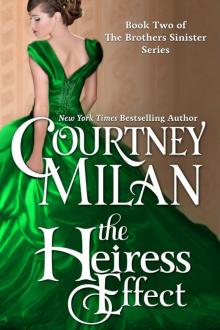 The Heiress Effect
The Heiress Effect Unraveled
Unraveled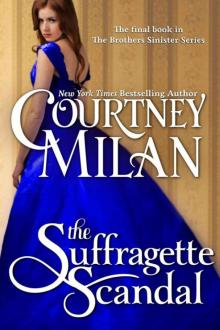 The Suffragette Scandal
The Suffragette Scandal The Year of the Crocodile
The Year of the Crocodile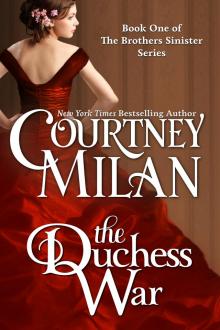 The Duchess War
The Duchess War What Happened at Midnight
What Happened at Midnight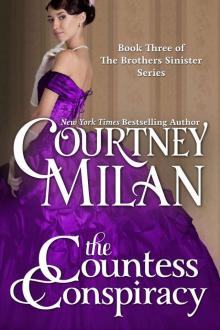 The Countess Conspiracy
The Countess Conspiracy Proof by Seduction
Proof by Seduction Unlocked
Unlocked Trial by Desire
Trial by Desire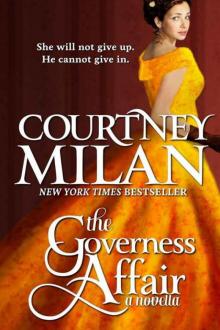 The Governess Affair
The Governess Affair Unveiled
Unveiled The Lady Always Wins
The Lady Always Wins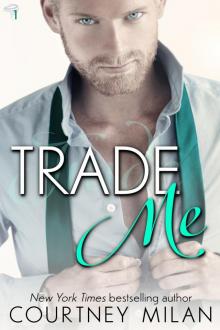 Trade Me
Trade Me Unclaimed
Unclaimed This Wicked Gift
This Wicked Gift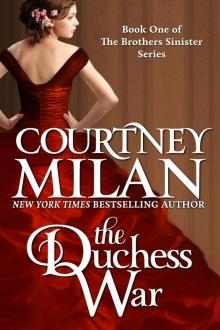 The Duchess War (The Brothers Sinister)
The Duchess War (The Brothers Sinister) Hamilton's Battalion: A Trio of Romances
Hamilton's Battalion: A Trio of Romances The Turner Series
The Turner Series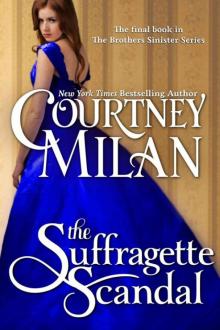 The Suffragette Scandal (The Brothers Sinister)
The Suffragette Scandal (The Brothers Sinister)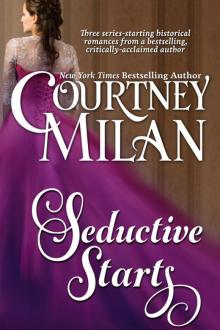 Seductive Starts
Seductive Starts The Pursuit Of…
The Pursuit Of… Hamilton's Battalion
Hamilton's Battalion The Carhart Series
The Carhart Series Seven Wicked Nights
Seven Wicked Nights This Wicked Gift (A Carhart Series Novella)
This Wicked Gift (A Carhart Series Novella)